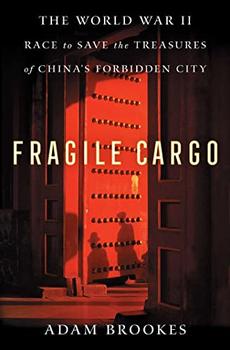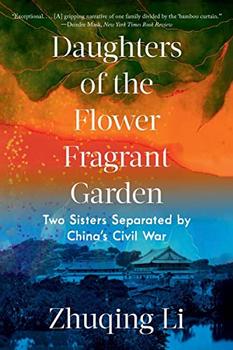Summary | Excerpt | Reviews | Beyond the book | Read-Alikes | Genres & Themes | Author Bio

The World War II Race to Save the Treasures of China's Forbidden City
by Adam BrookesAs Japanese soldiers approached Beijing in 1931, China's government decided that the rarest treasures housed in the city's Palace Museum needed to be evacuated to safer territory. Overseen by Palace Museum director Ma Heng, some 63,500 irreplaceable artifacts were packed into nearly 20,000 cases and sent on a journey that would span thousands of miles and many years. Novelist Adam Brookes makes his first foray into nonfiction with his magnificent chronicle of their efforts, Fragile Cargo: The World War II Race to Save the Treasures of China's Forbidden City. Brooke's narrative tells the tale not only of the objects' harrowing travels, but also China's history just before, during and after World War II, as well as the lives of Ma Heng and the three assistant curators – Chuang Yen, Ouyang Daoda and Na Chih-liang – who were instrumental in the items' safe passage.
The author begins by explaining why such extraordinary measures were taken to protect the antiquities. The Republic of China was still a young country, created when the ruling dynasty was overthrown in 1912. The new government sought to foster an "awareness of nationhood," Brookes writes, "a way to conceive of themselves not as subjects of an empire but as citizens of a modern nation-state, sharing a common identity that transcended yawning differences in class, region, and language." The Palace Museum and the works within it were meant to help create a unified national identity by giving people a sense of shared national history. The objects were a physical manifestation of that common heritage and as such were of vital importance.
It's astonishing to read Brookes' account of how meticulously the curators documented the Palace Museum collection (the full inventory included 1,170,000 pieces and ran to 28 volumes) and the extreme care they took in packing the items. The antiquities "faced assorted dangers – bombing, plunder by Japanese troops or by bandits, weather, damp, pests, poor roads, turbulent rivers, rotted joists, and accidents of all kinds – but poor packing posed the greatest danger of them all." The author goes into fascinating depth about several irreplaceable artifacts and how each type of object was fastidiously stowed away. For example, the Stone Drums of Qin - 10 ancient, engraved boulders, each weighing half a ton - took months to prepare for shipping. Curators soaked delicate cotton-based paper in water. "Then, using tweezers, they inserted scraps of the wet paper very gently under and around [the] fragile, flaking slivers of rock that threatened to fall away. Once the wet paper dried, it would act as a sort of cement to seal in place the vulnerable areas on the stone surface and preserve what remained of the inscriptions." The effort expended making sure no item was damaged while being transported absolutely boggles the mind. Keeping the collection safe while on the move was a monumental task, taking years of non-stop, exacting care by the diligent, single-minded curators.
The collection was moved from Beijing to Nanjing and then to Shanghai, where the curators thought the cases would be safe in Shanghai's International Settlement and its French Concession – two areas reserved for Western governments. It soon became apparent, however, that the territories weren't as sacrosanct as believed, so the cases were returned to Nanjing. As Japanese troops pushed farther inland, Nanjing became equally unsafe, and so the items needed to be transported yet again. Because time was of the essence and the cases needed to be evacuated as soon as possible, they were split into three separate consignments, each taking a different route to reach sanctuary in China's west. The last of the 17,000 cases left the city just 10 days before it fell to the Japanese. The author is at his best here as he relays the obstacles each team had to overcome to ultimately find safe storage for the treasures. It's a nerve-wracking account, relating near disasters on treacherous mountain roads and turbulent rivers; Brookes' experience as a thriller writer is evident.
The book loses a little steam as WWII ends; some of the urgency behind the collection's movements begins to abate as the narrative's focus shifts to the ascendancy of China's Communist Party. It remains a very compelling read, however, although more informative than nail-biting at that point.
For me, Fragile Cargo checks all the right boxes for top-notch nonfiction: the author's subject is a fascinating one, covering a little-known aspect of history; the curators he features are sympathetic, hard-working men with a challenging and important task; and he includes just enough information about China's history to set context, but not so much that his subject gets lost amid the intricacies of Chinese politics. It's a masterful work, and one I highly recommend to most audiences, but especially to those interested in WWII history in general and Chinese history in particular. It would make a good selection for history-based book groups as well.
A Note on Peking and Beijing
Both Peking and Beijing are approximations of the sounds Chinese use to pronounce the characters 北京. In the 1950s, the Chinese government-initiated language reforms to establish an official Romanized spelling system for use in transcribing Chinese words into other languages; this rendered sounds that had formerly been KI into JI, and thus Peking into Beijing. This spelling system was largely ignored outside of China until the late 1970s when the Chinese government refused to transcribe Chinese words any other way; and, thus, by the mid-1980s, most English language media referred to China's capital city as Beijing. The authors of Fragile Cargo refer to Peking when talking about the city of the past, but for simplicity, we have referred to Beijing throughout.
![]() This review was originally published in The BookBrowse Review in April 2023, and has been updated for the
October 2023 edition.
Click here to go to this issue.
This review was originally published in The BookBrowse Review in April 2023, and has been updated for the
October 2023 edition.
Click here to go to this issue.

If you liked Fragile Cargo, try these:

Daughters of the Flower Fragrant Garden
by Zhuqing Li
Published 2023
Sisters separated by war forge new identities as they are forced to choose between family, nation, and their own independence.

by Nicole Mones
Published 2015
In this stunningly researched novel, Nicole Mones not only tells the forgotten story of black musicians in the Chinese jazz age, but also weaves in a startling true tale of Holocaust heroism little-known in the West.
Your guide toexceptional books
BookBrowse seeks out and recommends the best in contemporary fiction and nonfiction—books that not only engage and entertain but also deepen our understanding of ourselves and the world around us.